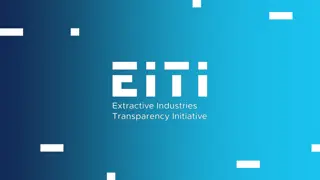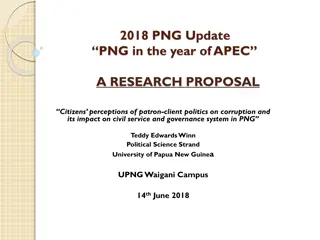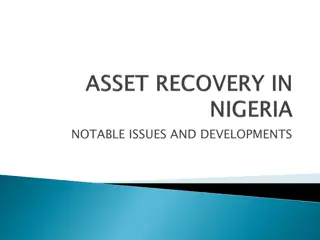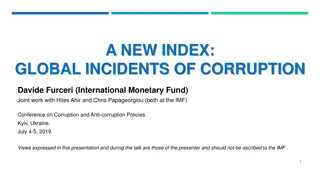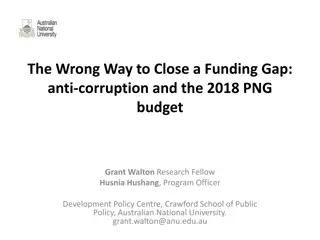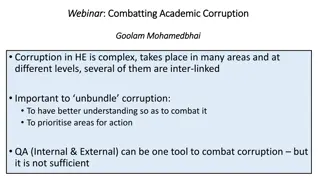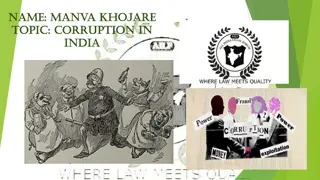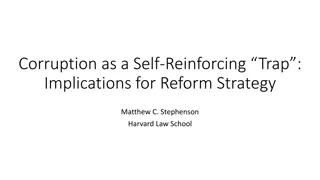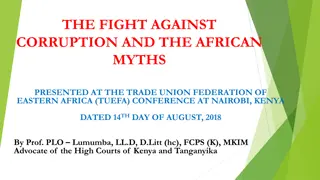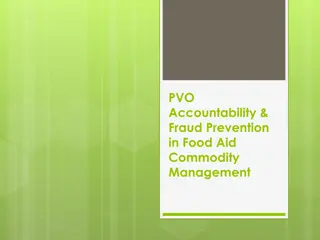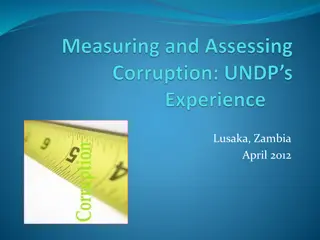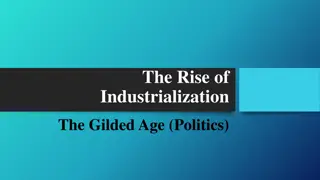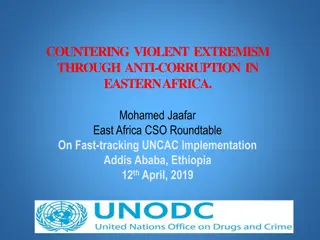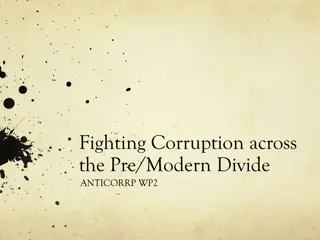International Anti-Corruption Frameworks and State Compliance
Scholarship on state compliance with international law and the impact of anti-corruption standards on domestic policies is growing, yet there is a lack of systematic studies on how states comply with and implement these standards. Various organizations and conventions focus on combating corruption at both national and international levels, emphasizing the need for coordinated anti-corruption efforts. This article highlights the importance of monitoring state compliance with anti-corruption conventions and encourages further research in this area.
Download Presentation

Please find below an Image/Link to download the presentation.
The content on the website is provided AS IS for your information and personal use only. It may not be sold, licensed, or shared on other websites without obtaining consent from the author.If you encounter any issues during the download, it is possible that the publisher has removed the file from their server.
You are allowed to download the files provided on this website for personal or commercial use, subject to the condition that they are used lawfully. All files are the property of their respective owners.
The content on the website is provided AS IS for your information and personal use only. It may not be sold, licensed, or shared on other websites without obtaining consent from the author.
E N D
Presentation Transcript
WP10, ANTICORRP Project Lead partner: ELIAMEP Partners: EUI, Hertie, SAR, Basel Institute, and BCE
EU: soft law and hard law instruments, - i.e. 1997 Convention on the fight against corruption involving officials of the European Communities or officials of MS of the EU - - 2011 New mechanism: EU anti-corruption report (every 2 years) Council of Europe ( intrinsically linked to democratic values, the rule of law, human rights. Most important instruments are a) Twenty guiding principles for the fight against corruption (1997); b) Criminal Law Convention (c) Civil Law Convention EU: lack of an explicit competence, yet, it has adopted Council of Europe (CoE CoE) ) approach against corruption,
CoE, Group of States Against Corruption (GRECO) mechanism monitoring state compliance with the CoE conventions, through peer process evaluation; identification of deficiencies in national anti-corruption policies and promotion of reforms; 4 rounds of evaluation OECD Convention officials in international business 2003 UN Convention against corruption development and implementation of effective and coordinated anti-corruption policies 2009: Establishment of a Review Mechanism overseen by the Implementation Review Group and organised in cycles focusing on different provisions of the 2003 Convention Group of States Against Corruption (GRECO) OECD Convention on combating bribery of foreign public officials in international business transactions (1997) UN Convention against corruption; calls for the on combating bribery of foreign public
Flourishing scholarship on state compliance with international law, but little in regard to anti- corruption Also flourishing scholarship on studies on the phenomenon of corruption across many disciplines Single country case-studies explore how international and European anti-corruption standards influence domestic laws and policies But no systematic study on whether, the extend to which, and the conditions under which such international standards are complied with and implemented by states But no systematic study on whether, the extend to which, and the conditions under which such international standards are complied with and implemented by states
Measure state compliance and implementation of international anti-corruption norms in Europe; Explore whether international law has an independent causal influence corruption laws, policies and practices adopted by EU states; I Identify patterns of variation compliance and implementation, whether cross- national, or across sectors and issue areas; and E Explore the factors that account for significant variation Measure state compliance and implementation whether international law has an independent causal influence over the anti- dentify patterns of variation of state xplore the factors that account for significant variation across sectors or states.
Compliance standard of an int l convention and domestic law, Implementation which national authorities enforce and put international standards into practice through the passage of legislation, the creation of institutions and the enforcement of rules Effectiveness corresponding prescriptions to tackle the social problem that it is intended to redress, to induce change in state behaviour and to achieve its policy objective Compliance: the discrepancy between the legal Implementation: the efforts of, and degree to Effectiveness: the efficacy of a given norm and its
A set of studies of the EU and the CoE instruments that directly or indirectly address issues of corruption and favoritism Political party funding Organised crime: proceeds of corruption and money laundering Conflict of interest Public procurement The first 3 will do a large-N study of all EU-28 states. The last one shall explore the effects of ECJ and national court decisions related to public procurement on favoritism in public contracts Political party funding (GRECO, 3rdround) proceeds of corruption and money laundering (GRECO, 2ndround) Conflict of interest (GRECO, 2ndround) Public procurement in EU law:
Compliance with (and even implementation of) international and European anti- corruption standards may be fortuitous and not the result of international law and monitoring its mechanisms May be an artefact of a legal standard grafted onto a treaty We need to detect and isolate the goodness of fit (degree of pre-existing state compliance with international standards), from the degree of compliance that is achieved as a result of pressure exercised by international monitoring bodies
Distinguish between goodness of fit and international norms-induced compliance. Set of criteria and questions in each issue area of focus on the basis of which to code: a) the pre-existing legal and institutional frame b) its capacity to enforce the legal and the policy objectives Such capacity refers to the resources with which existing or newly created anti-corruption institutions and bodies are endowed, their mandate and independence, the coordinating potential of all existing bodies, their political clout, or other. legal and institutional frame that is in place in each country; and capacity to enforce the legal regulations and the policy objectives that underpin them. regulations
Subsequently, we will determine the extent to which states have pursued reforms following the monitoring by GRECO and its recommendations, and measure this We will make these assessments by drawing on the information and documentation contained in the various evaluation and compliance reports issued by GRECO for the EU countries Phase 3 of the project: engage in comparisons across countries and issue areas Phase 4 of the project: policy recommendations and briefs Plan of a collective volume (2ndphase) and a special issue of a journal (3rdphase)
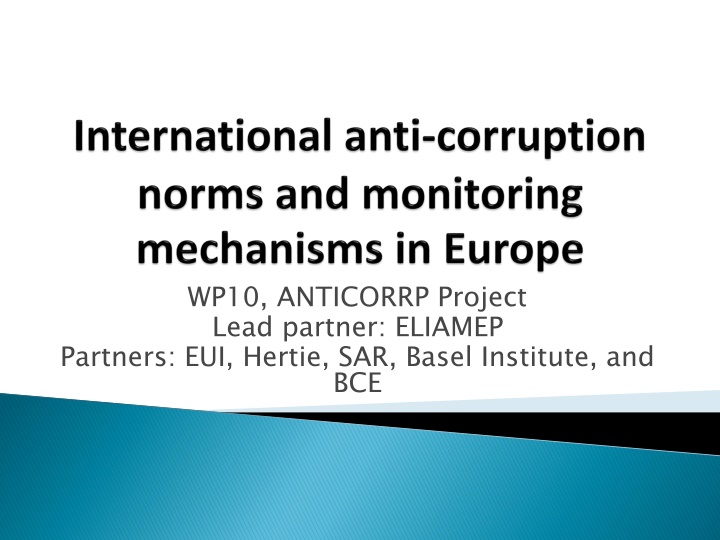

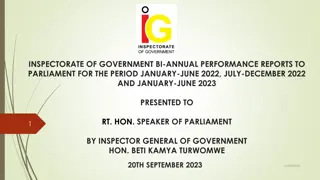

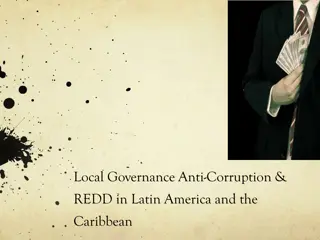
![Comprehensive Overview of Corruption Watch Submission on Public Procurement Bill [B18B-2023]](/thumb/138344/comprehensive-overview-of-corruption-watch-submission-on-public-procurement-bill-b18b-2023.jpg)
